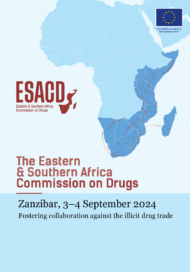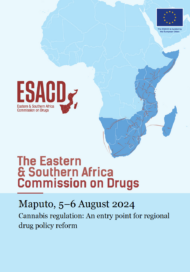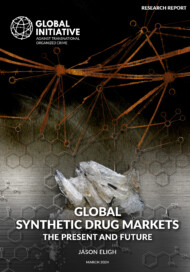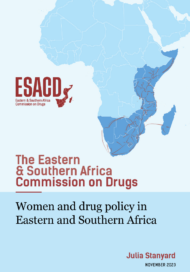Posted on 23 Sep 2024
The Eastern and Southern Africa Commission on Drugs (ESACD) held its third high-level meeting in Zanzibar, on 3 and 4 September 2024, to work on developing mitigation and harm reduction strategies in the face of an escalating regional illicit drug trade. The chair of the commission, former President of South Africa Kgalema Motlanthe, was joined by fellow commissioners, former President of Mozambique Joaquim Chissano, former President of Mauritius Cassam Uteem, and Associate Research Director of CAPRISA Professor Quarraisha Abdool Karim, and several high-level government representatives. The event was organized by the ESACD, supported by the European Union through its ENACT project (Enhancing Africa’s Response to Transnational Organized Crime) and implemented with the Global Initiative Against Transnational Organized Crime (GI-TOC) in its capacity as the secretariat to the commission.
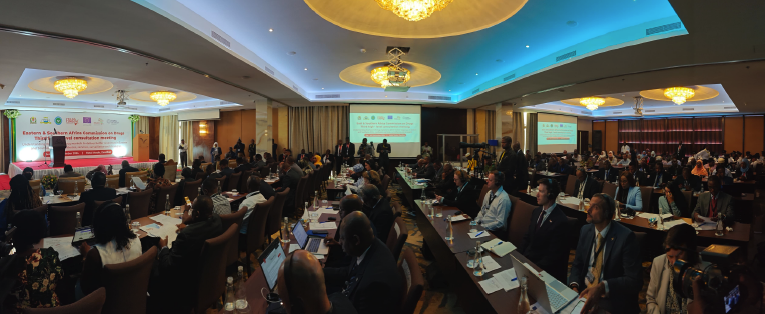
In line with the two previous high-level meetings, the third consultation brought together speakers with diverse experiences around a set of pre-defined themes, in order to collectively uncover the precise complexities of the regional drug landscape. Opening the meeting, Maria Rosa Sabbatelli, Head of the Unit for Global and Transregional Threats and Challenges at the European Commission’s Service for Foreign Policy Instruments, stressed the importance of developing ‘comprehensive and balanced national drug strategies that emphasize law enforcement, public health and social interventions’. She reflected on the benefit of sharing some of the experiences of the European Monitoring Centre for Drugs and Drug Addiction (now the European Union Drugs Agency), highlighting the interrelationship between global and regional initiatives to reform drug policies. Sabbatelli underlined how actions taken by the countries of Eastern and Southern Africa are important not only for the region, but also as a contribution to global efforts to address drug-related challenges, particularly as ‘policy changes in one country can have a significant impact on its neighbours’.
Minata Samaté Cessouma, African Union Commissioner for Health, Humanitarian Affairs and Social Development, echoed Sabbatelli’s comments on the importance of this meeting beyond the borders of Eastern and Southern Africa, in a foretaste of what session moderator Advocate Vusi Pikoli would later describe as a clarion call for the whole of Africa to unite against the threat of drug trafficking. Cessouma noted that the efforts of the African Union mirror those of the European Union in prioritizing ‘evidence-based approaches, regional cooperation and sustainable intervention models’.
The meeting was also honoured by Hemed Suleiman Abdulla, Second Vice President of the Revolutionary Government of Zanzibar, who reiterated the message that the illicit drug trade is a ‘threat facing all countries in Africa and the entire world’, particularly given the rapid global expansion and diversification of drug markets. He briefly outlined his government’s own commitment to developing strategies to mitigate the harms of the trade, and through practical efforts taken both on the Tanzanian mainland and in Zanzibar. Abdulla cited the work of the Drug Control and Enforcement Authority, which was well represented at the meeting. Through collaboration with regional governments, the international community and civil society, including the European Union, the African Union and the ESACD, Abdulla suggested that joint commitment and support could lead to sustainable efforts towards strategies that reflect the needs of the Eastern and Southern Africa region and radiate outwards to positively influence global practices.
Reflecting the multidimensional nature of the drug challenge in the region articulated by the speakers in the high-level segment, the working-level session was organized around four themes, all of which have been identified as priorities by the commission: synthetics, services, surveillance and strategies. These themes were explored by representatives from civil society, multilateral organizations, international non-governmental organizations and academia, alongside the high-level government representation. The four themes opened up a policy-driven conversation that examined from different angles the regional challenges of improving knowledge through data-driven surveillance; the ineffectiveness of current drug policy strategies; the poor access to health and welfare services for people who use drugs; and the rapidly emerging threats posed by the expansion of synthetic drug markets.
